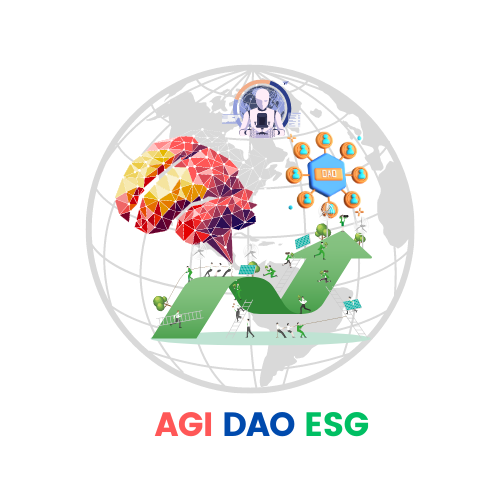A unified approach that merges the concepts of Artificial General Intelligence (AGI), Decentralized Autonomous Organizations (DAOs), and Environmental, Social, and Governance (ESG) criteria presents a fascinating intersection of technology, organizational structure, and sustainability. By combining these three concepts, it is possible to create intelligent, decentralized organizations that operate based on ethical and sustainable principles.AGI, often referred to as “strong AI,” is the concept of creating machines that possess general intelligence, similar to human intelligence. These machines would be capable of understanding and learning any intellectual task that a human being can do. The integration of AGI into organizations could revolutionize decision-making processes by leveraging advanced algorithms and data analysis to make informed choices.DAOs, on the other hand, are organizations that operate based on smart contracts and blockchain technology. These organizations are decentralized, meaning that decision-making power is distributed among stakeholders rather than being centralized in a traditional hierarchical structure. DAOs promote transparency, accountability, and stakeholder participation, allowing for a more democratic approach to governance.ESG criteria are a set of standards used to assess an organization’s performance in terms of environmental, social, and governance factors. These criteria are increasingly important in today’s world, as businesses are being held accountable for their impact on the environment and society. By integrating ESG criteria into the decision-making processes of AGI-powered DAOs, organizations can prioritize environmental protection, social equity, and good governance.The integration of AGI, DAOs, and ESG criteria could lead to the creation of intelligent, decentralized organizations that operate in a sustainable and ethical manner. These organizations would leverage AGI to analyze vast amounts of data and make informed decisions that prioritize environmental protection, social equity, and good governance.For example, an AGI-powered DAO could use data analysis to identify the most sustainable and environmentally friendly practices for a manufacturing process. It could consider factors such as energy consumption, waste management, and carbon emissions to make decisions that minimize the organization’s environmental impact.Furthermore, the decentralized nature of DAOs ensures that decision-making power is distributed among stakeholders, promoting transparency and accountability. Stakeholders, including employees, customers, and the wider community, can participate in the decision-making process and hold the organization accountable for its actions.Integrating ESG criteria into the decision-making processes of AGI-powered DAOs would provide a framework for assessing an organization’s performance in terms of environmental, social, and governance factors. This would enable organizations to measure and improve their sustainability practices, ensuring that they operate in a manner that is both ethical and environmentally responsible.In conclusion, the integration of AGI, DAOs, and ESG criteria presents an exciting opportunity to create intelligent, decentralized organizations that prioritize ethical and sustainable practices. By leveraging AGI’s capabilities, organizations can make informed decisions that consider environmental protection, social equity, and good governance. The decentralized nature of DAOs promotes transparency and stakeholder participation, while the inclusion of ESG criteria ensures that organizations are held accountable for their impact on the environment and society. This unified approach has the potential to revolutionize how organizations operate and contribute to a more sustainable and equitable future.
The Intersection of Artificial General Intelligence, Decentralized Autonomous Organizations, and Environmental, Social, and Governance Criteria
/

Leave a Reply